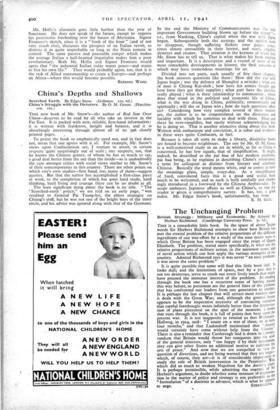The Unchanging Problem
British Strategy : Military and Economic. By Admiral Sir
Herbert Richmond. (Cambridge University Press. 35. 6d.) THIS is a remarkable little book. In the space of about 30,000 words Sir Herbert Richmond attempts to show how Britain has met the eternal problem of the relative proportions of the different ingredients of our war-effort by a study of the nine major wars in which Great Britain has been engaged since the reign of Queen Elizabeth. The problem, stated more specifically, is what are the relative proportions of military action, in the narrower sense, and of naval action which can best apply the various strengths of the country. Admiral Richmond says it was never "an easy problem; it was never the same problem." It is quite possible that some will find this little book dull. It looks dull; and the limitations of space, met by a pen that is not too dexterous, serve to crush out every lively touch that mi!ht have pointed the immense interest of the problem. In reading through the book one has a recurrent sense of having passed this way before, so persistent are the general lines of the problem that has confronted our leaders from one generation to another It is perhaps the last chapter that will attract most readers since it deals with the Great War; and, although the general lesson appears to be the imperative necessity of convincing ourselves that careful forethought wears infinitely better than the improvisa- tion of plans piecemeal on the spur of the moment, a theme that runs through the book, it is full of points that bear upon the present war. It is not inapposite to remind us that Bethmann- Hollweg, in 1914, said : "I count on a war of three, or at most four months," and that Ludendorff maintained that " &sate! would certainly have come without help from the Ukraine. There is also a reminder that Castlereagh laid it down in .1 mem°' randum that Britain would throw her conquests into the sfele of the general interests, only "too happy if by their restorred, they can give other States an additional motive to cultivate the arts of peace." And now. that we are compelled to face the question of diversions, and are being warned that they are traps-- which, of course, they are—it is of considerable importance to study the role of British intervention in the Peninsular War, which did so much to weaken Napoleon for the decisive clO It is perhaps permissible, while admitting the cogency of.55 Herbert's argument, to doubt whether some measure of improvIsa- don in the matter of policy and strategy is not preferable to the "formulation "of a doctrine in advance, which is what he apPears to urge. STRATEGIC:US






























 Previous page
Previous page